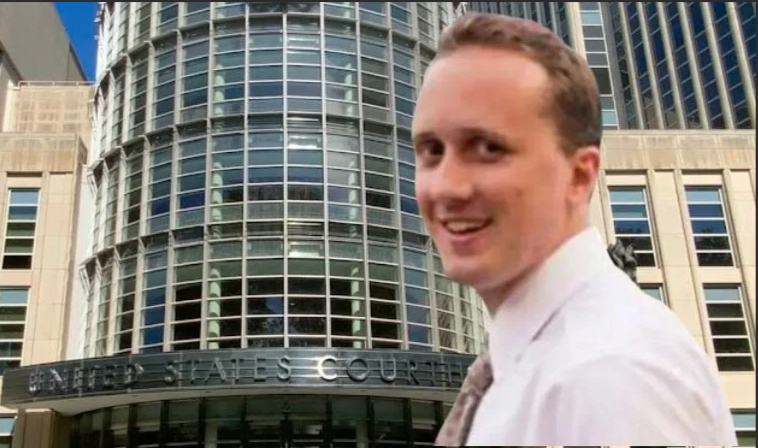Appeals Court Overturns Election-Interference Conviction for Creator of Anti-Hillary Clinton Meme
In a major victory for free speech advocates and critics of the Biden Justice Department, the Second Circuit Court of Appeals has overturned the controversial conviction of pro-Trump meme creator Douglass Mackey. Mackey had been found guilty last year of “election interference” for posting a satirical meme in 2016 that encouraged Hillary Clinton supporters to vote via text—something that was obviously not legally possible.
On March 31, 2023, the U.S. Attorney’s Office for the Eastern District of New York confirmed the verdict.
“Mackey has been found guilty by a jury of his peers of attempting to deprive individuals from exercising their sacred right to vote for the candidate of their choice in the 2016 Presidential Election,” U.S. Attorney Breon Peace said in a press release. “Today’s verdict proves that the defendant’s fraudulent actions crossed a line into criminality and flatly rejects his cynical attempt to use the constitutional right of free speech as a shield for his scheme to subvert the ballot box and suppress the vote.”
The 3-0 decision by the appeals panel concluded that Mackey’s actions, while provocative and politically charged, were protected under the First Amendment. The court ruled that his meme, which mocked gullible Clinton voters, constituted political satire—an expression of opinion rather than a criminal act. The ruling calls into question the Justice Department’s pursuit of Mackey under 18 U.S. Code § 241, a statute originally intended to stop Ku Klux Klan voter intimidation, not prosecute online trolls.
Judge Michael Park, writing for the panel, emphasized that Mackey’s post “did not deprive anyone of the right to vote” and that “there is no evidence that even a single vote was affected.” The court’s language underscored the absurdity of treating internet satire as a federal crime, a move many saw as a political witch hunt by a left-leaning Justice Department desperate to punish Trump supporters.
Mackey, known online by his alias “Ricky Vaughn,” had faced up to 10 years in prison following his 2023 conviction. The meme that led to his prosecution featured a picture of an African American woman with the caption: “Avoid the Line. Vote from Home. Text ‘Hillary’ to 59925.” The post was one of hundreds of sarcastic, humorous, or hyperbolic content pieces that flooded social media during the heated 2016 election.
Critics of the prosecution argued that the DOJ’s pursuit of Mackey was not about upholding democracy but about punishing dissent. “This was clearly an effort by the Biden administration to make an example out of a meme maker,” said conservative commentator Charlie Kirk. “If you can’t beat them with ideas, you criminalize their jokes.”
The selective nature of the prosecution also raised eyebrows. At the time of Mackey’s trial, his defense attorneys noted that left-wing influencers had posted nearly identical satirical memes aimed at Trump voters during the same election cycle—yet none were prosecuted. This glaring inconsistency further bolstered concerns of political bias and prosecutorial overreach.
Mackey’s legal team hailed the decision as a landmark moment for free expression in the digital age. “The First Amendment protects speech that challenges, mocks, and even offends,” said Andrew Frisch, one of Mackey’s attorneys. “Political discourse, especially satire, must not be criminalized based on the ideology of the speaker.”
Christian conservatives also praised the decision, calling it a blow to the secular state’s attempt to suppress dissenting voices. “This case was a litmus test for the direction of our country,” said Pastor Greg Locke. “Will we remain a nation where satire and speech are free, or will we allow the government to jail those who speak against their chosen leaders?”
The Justice Department has yet to respond to the ruling but is expected to face immense pressure not to appeal further. With the 2024 election cycle still under scrutiny and the DOJ’s reputation already suffering due to its handling of Trump-related investigations, any further pursuit of Mackey may prove politically disastrous.
This case also highlights the broader debate over Big Tech, censorship, and the role of government in regulating online speech. While platforms like Twitter (now X) have previously banned satirical and conservative accounts, the courts have increasingly leaned toward protecting even controversial online content, provided it doesn’t cross into direct threats or incitement.
Mackey expressed gratitude for the court’s ruling and thanked his supporters for standing with him. “This was never about justice—it was about power,” he posted on X. “The regime tried to criminalize dissent, and today, the Constitution held the line.”
Legal scholars anticipate this case could set a precedent for future prosecutions related to online speech and political expression. The ruling sends a clear message that attempts to criminalize digital satire, especially when selectively applied, will face strong constitutional scrutiny.
The reversal is also a stark warning to the Biden administration and its allies in the Justice Department, who have increasingly used lawfare to silence political opposition. From targeting parents at school board meetings to raiding pro-life activists, a pattern has emerged—one that suggests the federal government has weaponized its power against citizens who dare to oppose the ruling ideology.
With the 2026 midterms looming, conservative leaders hope this ruling will embolden more Americans to speak freely without fear of being jailed for posting memes or voicing political satire online. As Mackey’s case shows, the fight for liberty isn’t only fought at the ballot box—it’s also fought on the battlefield of free speech.
Keywords:
Douglass Mackey, anti-Hillary meme, appeals court ruling, free speech, First Amendment, political satire, Justice Department overreach, conservative censorship, election interference overturned, pro-Trump meme creator





